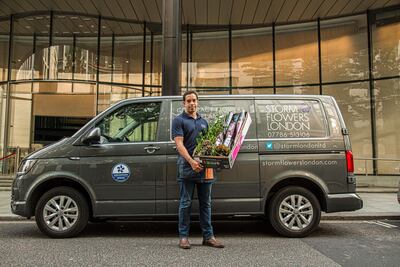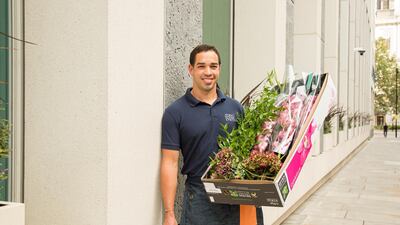At the end of last year, London business owner Joao Rocha saw his corporate flower and Christmas tree business, Storm Flowers, achieve new highs.
The company had received its largest number of Christmas tree orders from offices across the UK capital and the business had experienced year-on-year growth of 25 per cent since he bought it in 2014. Fast forward six months, however, and British-Brazilian Mr Rocha feared he may lose his business altogether.
The company supplies fresh flowers, plants, orchids and Christmas trees to offices across Central London and the City but with the Covid-19 lockdown forcing employees out of offices, demand for his service had disappeared.
"After three months of lockdown, I feared I would not have a business to go back to" Mr Rocha told The National. "We went from seven staff being rushed off our feet working six days a week to everything stopping completely. We invested in two vans last year and I was worried about fixed costs such as rent on my storage unit and insurance for the vans. For a while it was a case of 'where is the money going to come from'?"
While some offices remained open in the early weeks of the lockdown, expecting the situation to be short-term, demand for fresh flowers gradually dried up with some companies switching to a weekly orchid service and others pausing their contract until the restrictions eased.
“There were offices with 1,000 staff that reduced to 60 key people or less so they didn’t need flowers in reception,” said Mr Rocha.

While the company owner furloughed his florist under the UK government’s job retention scheme, he managed to pay his freelance staff during the three-month lockdown. This was partly due to a £10,000 (Dh47,340) rate relief grant he received from the government as well as a £50,000 bounce back loan, which he will have to repay. The landlord of his storage unit, where he stores his stock, also gave him a 50 per cent discount on two months’ rent.
Mr Rocha used the extra time during lockdown to streamline processes in his business and make it more sustainable, switching to biodegradable cellophane, eco-friendly gardening products and pledging to walk between contracts rather than drive.
The Storm Flowers team also created a series of gardening products to sell online, such as florist aprons, with the product sourced and produced in Scotland, and Christmas tree skirts to decorate the base of festive trees. They also created a line of desk plants that companies could buy and send to staff working at home as a motivational tool.
The Soho resident also put the company’s vans to use during the lockdown by volunteering for Westminster City Council and delivering food bank parcels to the vulnerable. He also supplemented his income by taking on landscaping contracts, designing balconies and walled gardens for residents living in the capital who wanted a better view from their work-from-home office.
Last month, however, the company owner noticed green shoots of recovery with slightly more activity in Central London offices, albeit under restricted circumstances.
He said: “In early August, we saw people start mentioning going back to the office. The government said they were going to reopen schools and a lot of people felt the need to go back to work because they no longer had childcare to think about. It also got to the point where people wanted a change of scene – they were growing tired of Zoom meetings.”
Since then, some of Mr Rocha’s clients have un-paused their contracts and the business owner has secured a number of new clients.
Another notable change has been a rise in Christmas tree bookings with orders now on par with last year.
“I think people want something to look forward to again,” said Mr Rocha. “They are hopeful. But there is definitely more activity in Central London now and we have received a lot more interest and requests over the past two weeks.
“We never lost any contracts but we did have to pause them so this is the year to survive as a small business. It’s not about making a huge profit. After seven months of very little business, the only aim is to still be here at the end of the year.”


